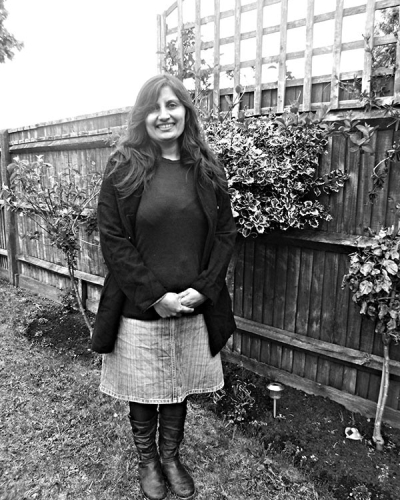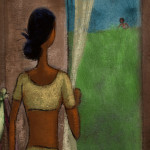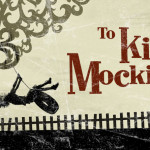Memories Revived
Born and brought up in Kallianpur, India, Renita D’Silva moved to London, UK, post her marriage. Though armed with an engineering degree, her love of writing propelled her to translate the stories in her mind into novels. The short stories written by this avid reader-turned-author have found public space in e-zines and magazines abroad.
What triggered the career switch?
I have always wanted to write. Some people count sheep to fall asleep at night, I craft stories with characters whom I meet with, every night as I settle into bed. Earlier I treated it as a hobby, because, growing up in a small village in India in the ’80s, we did not know of many writers who had made a career of their craft. We did, however, know plenty of engineers who had carved respectable livelihoods. I studied engineering and worked in IT even though writing always remained a passion. I quit software when my kids came along. And when my daughter started nursery, with my son already at school, I had some free time to indulge my passion. I enrolled in an Adult Education Creative Writing Course and started penning stories that I actually shared with other people instead of just storing them in the privacy of my head. I discovered that my stories were liked, a few of them got published in magazines and anthologies, won competitions and awards and that gave me the encouragement to start writing my novels.
Why Monsoon Memories?
I started writing Monsoon Memories in the winter; one of those dreary grey days when I used to pull out my favourite memory of home and relive it – it warmed me, offered solace. And I thought, what if this woman who lives in the UK like me and misses home desperately, cannot access her memories because of something that happened in her past? Who would she be without her memories anchoring her, defining her? Thus Shirin was born, and with her particular predicament, I had the ‘Memories’ part of the title. The monsoons provide a milieu for the events in Shirin’s life.
What are the strongest memories of India that you have?
I remember endless sugarcane-scented summer afternoons playing cricket and lagori in the fields, running amok through the fruit orchards, hiding amongst coconut tree fronds, breathing in the heady smell of resin and earth and burgeoning life, biting into mangoes and guavas from neighbourhood gardens, the sticky juice running down my chin and attracting flies, getting bitten by ants and hounded by the posse of stray dogs that roamed our village. I recall my grandmother plaiting my hair, the smell of warm coconut oil, the feel of her hands on my head, making me feel drowsy and loved; my mother’s open-mouthed laughter, the sound of it like a silvery waterfall gushing amongst the hills; my grandfather making the toilet cockroach and lizard proof, every night, just for me. My grandmother chasing my brother through the house because the rock music he insisted on playing hurt her ears.
Do you miss living in India?
Yes, of course. They say childhood memories are indelible and for me, they are magical. When I am down, I pluck a memory from my stash and it has the same effect as being enveloped in my mother’s arms – it soothes me, makes everything right with my world again.
How much of an impact does your personal life have on your writing?
I think a little bit of every author is in every story he or she tells. In my books, I explore themes of duty, forgiveness and identity, the conflict between generations, the pressure of a closed society and what ‘going home’ entails – themes that are close to my heart. I grew up in a small village that was the hotbed of gossip, and, likewise, my books are mostly set in small villages, amongst generous, if narrow-minded people. Families, the ever-changing, constantly evolving dynamics between family members, intrigue me.
Do you have the plot completely worked out before you start writing?
I had read somewhere that a novel was supposed to be at least 70,000 words in length and each chapter was roughly 2,000 words in length. I applied what I had learned in my creative writing course, told myself that each chapter was really a short story, and took it from there, deciding to stop when I got to 70,000 words. It did not work quite that way of course. Somewhere midway the characters started dictating their story to me rather than the other way round. I was just a puppet, recounting what they wanted me to say. I got carried away by the sheer magic and joy of creating a book where the characters grow so much that they start bossing you around. They don’t let you sleep, they give you no peace until you have told their story the way they want it told. I normally have a rough plan but not a detailed one. I want to allow space for the characters to develop, want to allow the plot the flexibility to deviate from what was originally planned so I end up with something completely different from what I had envisioned but right for those particular characters and that particular story.
Your second work, The Forgotten Daughter, also deals with the search for a ‘relationship’. What prompts this continual quest?
We are all searching for that elusive something all the time. Modern-day life is such that we are continually questing – for the meaning of our existence, for happiness, for material things. We are on a pursuit of peace, on the hunt for spiritual fulfilment. It is what we are all obsessed with and I wanted to explore that. As a displaced person myself, having been brought up in India and now living in the UK, I wanted to examine what ‘roots’ mean to different people. Nisha, one of the protagonists of The Forgotten Daughter, is of Indian origin but is brought up by very Western parents. She has never visited India or experienced an urge to go there, until, that is, she finds a letter in her parents’ will informing her that she was adopted from India.
Are the journeys a metaphor?
Yes, they are a metaphor for the complicated, if brief, journey that is this one life we are given to lead. Monsoon Memories for Shirin is a journey towards forgiveness and acceptance. It is a coming to terms journey, a quest towards finding herself, the bits of her that are lost. For Reena, it is a coming-of-age journey, the unearthing of a secret that has been slumbering for more than a decade. In The Forgotten Daughter too, the three characters are embarking on journeys – Nisha, in a literal sense, to find her roots and in the process, she finds herself. Devi is on a journey of reconciliation with her estranged mother. For Shilpa, it is a journey towards acceptance of the choices she made in her life – often with devastating consequences.
Your favourite work?
Harper Lee’s To Kill a Mockingbird. I have read it many times over and have found something to admire every time. I love the way she tells the story from the point of view of a child so beautifully, and I love the story. I love everything about the book, cannot find a single fault with it and I look up to Harper Lee for creating, in my opinion, the perfect book.
Related posts from Verve:
Verve Trending
Sorry. No data so far.
us on Facebook to stay updated with the latest trends







